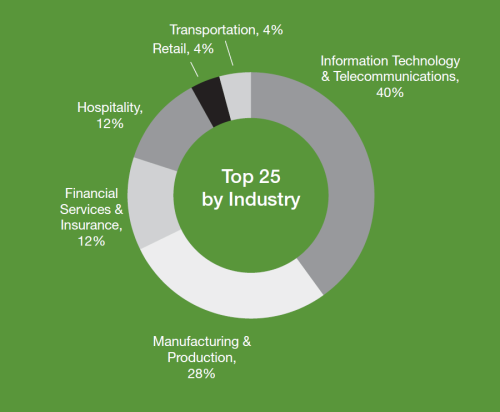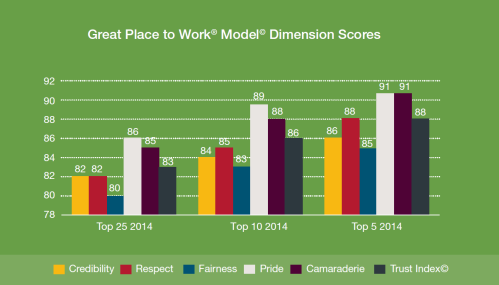 Here at Great Place to Work we’re getting ready to reveal the 2014 World’s Best Multinational Workplaces list, so there seems like no better a time to talk about a positive organizational trend that’s been occurring among many of the less encouraging trends we consistently hear about (for example, the war on talent, low levels of employee engagement, or no work/life integration). The positive trend that I’m speaking, to be exact, is that levels of trust, camaraderie and pride are rising at the best workplaces – essentially, the world’s best workplaces are getting better. In recent years we’ve seen “the best” companies get better in the majority of the ~50 countries where we measure workplaces using our Trust Index© employee survey. Additionally, we have seen increasing trust at the companies that make up Great Place to Work®’s annual World’s Best Multinational Workplaces list.
Here at Great Place to Work we’re getting ready to reveal the 2014 World’s Best Multinational Workplaces list, so there seems like no better a time to talk about a positive organizational trend that’s been occurring among many of the less encouraging trends we consistently hear about (for example, the war on talent, low levels of employee engagement, or no work/life integration). The positive trend that I’m speaking, to be exact, is that levels of trust, camaraderie and pride are rising at the best workplaces – essentially, the world’s best workplaces are getting better. In recent years we’ve seen “the best” companies get better in the majority of the ~50 countries where we measure workplaces using our Trust Index© employee survey. Additionally, we have seen increasing trust at the companies that make up Great Place to Work®’s annual World’s Best Multinational Workplaces list.

The good news is that while this increase in trust trend is mostly notable within “best companies,” such positive culture changes are influencing other companies as well and helping to create a push towards a higher standard for organizations. The data discussed here comes from the decision to examine trust trends in individual countries and among the world’s best multinationals as we prepared our 4th annual World’s Best Multinational Workplaces list. In particular, we studied the Trust Index© scores of all the national Best Workplaces lists during the past five years. The Trust Index© is Great Place to Work®’s 58-statement employee survey that measures trust, pride and camaraderie in organizations.
Our research highlights seven reasons why trust is rising in great workplaces: awareness, evidence, Generation Y, employee gratitude, wellbeing, momentum, and transparency. Globally, company leaders have been demonstrating an increased awareness towards the importance of a high-trust workplace culture. Furthermore, we’re seeing increasingly more evidence published that great workplaces lead to better business results. For example, publicly traded companies on the U.S. Best Companies to Work For list have nearly doubled the performance of the stock market overall from 1997 to 2013 and a paper published earlier this year by the European Corporate Governance Institute which studied data from 14 countries, concluded that higher levels of employee satisfaction (reflected by earning a spot on a best workplaces list generated by Great Place to Work®) corresponded to stock market outperformance in countries with high levels of labor market flexibility, such as the United States and the United Kingdom.
The Millennial generation is also an influencer. Globally, this generation is demanding better workplaces and pushing employers to place more focus on both social responsibility and work/life integration. Employee gratitude also plays a big role in high-trust cultures. Best workplace environments reflect employee gratitude and reciprocation and aren’t solely about what management is doing for employees. This is especially true during trying times for companies. When one company’s culture may take a turn for the worse during economic hardships, organizations that take care of their employees amid such a time can create higher levels of trust. We can also point to the ‘wellbeing’ movement as an influencer of high trust levels at organizations. With people placing more and more emphasis on mental and physical wellness, in part due to high stress work environments at many organizations, great workplaces are embracing the wellbeing trend. Among the three Trust Index© scores that have risen most among the World’s Best Multinational Workplaces is this statement: “People are encouraged to balance their work life and their personal life.”
Momentum and transparency are the last of the seven key trends we have noted as influencers of high-trust at organizations. Momentum refers to the positive upward spiral that seems to occur (owing to both management and employees) once an organization develops a trust-based workplace culture. This is logical as a more trust-based culture often sees employees that are more active participants in culture related activities and hold a greater appreciate for their workplace. With the amount of new technologies (like social media) and personal mobile devices available, organizations are faced with an amount of unprecedented transparency. This transparency works in favor of organizations with great cultures and rewards them while providing a “public eye” and ample incentive for less than great organizations to step up. Another of the three Trust Index© scores that have risen most among the World’s Best Multinational Workplaces is this statement: “Management keeps me informed about important issues and changes.”
Check out a few “Fast Facts” about the World’s Best Multinational Workplaces 2014 below, and be sure to check back here on Thursday to see which companies made the list!
Fast Facts: The World’s Best Multinational Workplaces 2014
- Since last year, industry distribution has changed significantly on the World’s Best list. IT and Telecommunications now makes up 40% of the industries, replacing Manufacturing and Production (28%) as the dominating industry. The variety of industries represented has shrunk from 8 industries in 2013 to just 6 this year:

- Among the 2014 World’s Best Multinational Companies to Work For in 2014, “Pride” is distinguished as the main strength. “Camaraderie” ranks stronger than “Respect” in the Top 10 and the Top 5, while “Fairness” continues to be biggest opportunity area:

- Since 2011, the main improvements made by the best multinationals in the world are:
- Encouraging work-life balance,
- Management keeping employees informed
- Promotions based on merit.



 Software Advice’s
Software Advice’s


